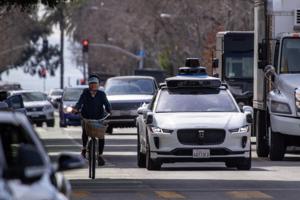Business
/ArcaMax

Vince Zampella, 'Call of Duty' co-creator, dies after crash on Angeles Crest Highway
Vince Zampella, the video game developer who helped launch the wildly lucrative and enduring "Call of Duty" franchise and "Apex Legends" studio Respawn Entertainment, has died.
A representative for Electronic Arts, which owns Respawn, confirmed Zampella's death Monday in a statement shared with The Times. He was 55.
"This is an unimaginable ...Read more

Fight between Waymo and Santa Monica goes to court
Waymo is taking the city of Santa Monica to court after the city ordered the company to cease charging its autonomous vehicles at two facilities overnight, claiming the lights and beeping at the lots were a nuisance to residents.
The two charging stations at the intersection of Euclid Street and Broadway have been a sour point for neighbors ...Read more

The best places to keep your emergency fund
Unexpected events, such as an emergency room visit or a broken-down car, can result in major financial problems when you don’t have an emergency fund in place.
It’s not just about having some cash — ideally enough to cover at least six months of your expenses — set aside for those worst-case scenarios, though. Where you keep that money...Read more

US suspends offshore wind leases in new setback for industry
The U.S. is suspending leases for all five wind farms under construction off the East Coast in the latest blow to a sector that’s been targeted repeatedly by the Trump administration as part of its attack on clean energy.
The U.S. Interior Department announced the move Monday, citing national security concerns and saying the massive turbines ...Read more
Many renters say they'll never buy a home, according to a national survey
This year, renters were burdened by housing costs, pessimistic about the economy, and less likely to say homeownership is part of the American dream, according to a survey by the national rental listing platform Zumper.
Zumper surveyed more than 6,000 renters across the country as part of its annual report about the state of renting. The report...Read more

Instacart ends AI pricing test that charged shoppers different prices for the same items
Instacart will stop using artificial intelligence to experiment with product pricing after a report showed that customers on the platform were paying different prices for the same items.
The report, published this month by Consumer Reports and Groundwork Collaborative, found that Instacart sometimes offered as many as five different prices for ...Read more

A tale of two Ralphs -- Lauren and the supermarket -- shows the reality of a K-shaped economy
John and Theresa Anderson meandered through the sprawling Ralph Lauren clothing store on Rodeo Drive, shopping for holiday gifts.
They emerged carrying boxy blue bags. John scored quarter-zip sweaters for himself and his father-in-law, and his wife splurged on a tweed jacket for Christmas Day.
"I'm going for quality over quantity this year," ...Read more

US suspends offshore wind leases in new setback for industry
The U.S. is suspending leases for all five wind farms under construction off the East Coast in the latest blow to a sector that’s been targeted repeatedly by the Trump administration as part of its attack on clean energy.
The U.S. Interior Department announced the move Monday, citing national security concerns and saying the massive turbines ...Read more

Major Kentucky bourbon maker Jim Beam shuttering distillery for 2026
One of Kentucky’s largest bourbon producers apparently is pausing whiskey production at the end of the year.
Jim Beam, which is one of the largest makers of American whiskey in the world, is planning to shut down production in Happy Hollow in Clermont Jan. 1 through 2026.
The visitors center on site will remain open for Kentucky Bourbon ...Read more

Insuring your pet? You should know about these changes to Florida law
As vet bills skyrocket, more and more pet owners are turning to insurance programs to prevent their pets’ surprise illness from becoming a financial hardship.
But the devil is in the details, and complaints have surfaced that procedures and care that consumers thought were covered by the policies they purchased actually weren’t covered.
A ...Read more

ULA President and CEO Tory Bruno steps down
United Launch Alliance’s leader for the last 12 years has stepped down.
ULA President and CEO Tory Bruno has resigned as of Monday to “pursue another opportunity,” according to a shared statement from the board chairs from Lockheed Martin and Boeing, which share a 50% ownership of the rocket company.
“We are grateful for Tory’s ...Read more
FOMO vs. bubble angst signals more stock volatility in 2026
The U.S. stock market is poised to be kept on edge next year as investors are caught between fear of missing out on the artificial-intelligence rally and concern that it’s a bubble just waiting to burst.
Big selloffs and quick reversals have been a feature of stock markets for the past 18 months. That trend is likely to continue heading into...Read more

In his national address, President Trump claimed he's bringing prices down. Here's what the data shows
After nearly two months without new consumer price data, the Bureau of Labor Statistics released its latest report Thursday, providing a glimpse at energy costs, food prices and other everyday expenses.
According to the consumer price index, inflation slowed in November, with prices rising 0.2% over the 0.3% observed in September. (BLS could ...Read more
Is there still such a thing as a 5% CD?
Currently, you can lock in annual percentage yields (APYs) on certificates of deposit (CDs) at and slightly above 4% with many nationally available CDs. Only a select few financial institutions offer promotional CDs that earn a 5% APY or greater, and most are closed-membership credit unions.
As a reporter who tracks CD rates daily, I take ...Read more

Waymos froze, blocked traffic during San Francisco power outage
Waymo’s driverless ride services were a high-profile victim of a power outage that affected large swaths of San Francisco, with cars freezing mid-ride across the city and disrupting traffic.
After traffic lights went dark at major intersections Saturday, social media videos showed multiple cars stopped in the middle of the street with their ...Read more

The 50 best wines under $50 from our critic, who tasted 2,874
It’s that time again.
I’ve been paging through my 2025 tasting notebooks, reviewing how many good and great wines I’ve sipped, as well as the number of boring overpriced duds. This year, my total of reds, whites, rosés and sparklers hit 2,874, from 26 countries. Admittedly, I sampled only a few from Moldova, Bolivia and Peru, but I plan ...Read more

California-based company recalls thousands of cases of salad dressing over 'foreign objects'
A California food manufacturer is recalling thousands of cases of salad dressing distributed to major retailers over potential contamination from "foreign objects."
The company, Irvine-based Ventura Foods, recalled 3,556 cases of the dressing that could be contaminated by "black plastic planting material" in the granulated onion used, according...Read more

Musk 2018 Tesla pay plan reinstated after 7-year legal fight
Elon Musk won reinstatement of his 2018 pay package as chief executive of Tesla Inc., after the Delaware Supreme Court reversed some findings of a judge who said the billionaire improperly influenced board members who formulated the record-breaking corporate compensation package.
The high court Friday concluded the world’s richest person is ...Read more

Boeing asks FAA to waive emissions rule for 777 freighter
Boeing Co. asked the Federal Aviation Administration to temporarily exempt its 777 freighter from an international rule on greenhouse gas emissions that takes effect at the end of 2027, citing a global shortage of widebody cargo jets.
In filing with the US regulator on Friday, Boeing asked for approval to make an additional 35 of its classic ...Read more

Big retailers like Target increasingly hit by online refund fraud
Noir Luxury Refunds marketed itself as an expert in helping consumers get refunds from retailers.
But its expertise was grounded in fraud, federal prosecutors say, and a Minnesota man is expected to be the 10th person to enter a guilty plea for the Noir racket.
Noir’s operatives spanned the country, though the fraud ring was allegedly run ...Read more
Popular Stories
- In his national address, President Trump claimed he's bringing prices down. Here's what the data shows
- Waymos froze, blocked traffic during San Francisco power outage
- Is there still such a thing as a 5% CD?
- FOMO vs. bubble angst signals more stock volatility in 2026
- Major Kentucky bourbon maker Jim Beam shuttering distillery for 2026









